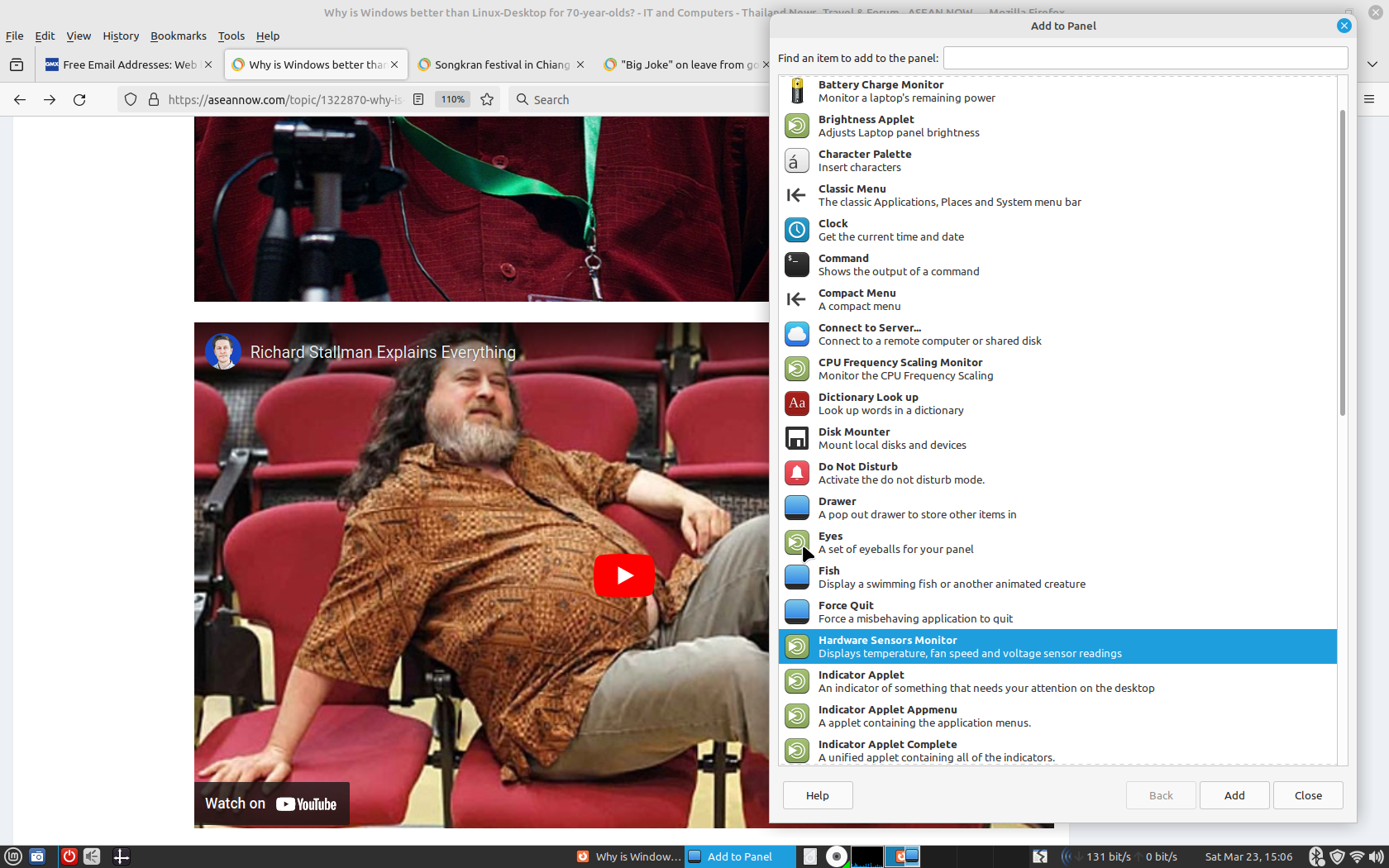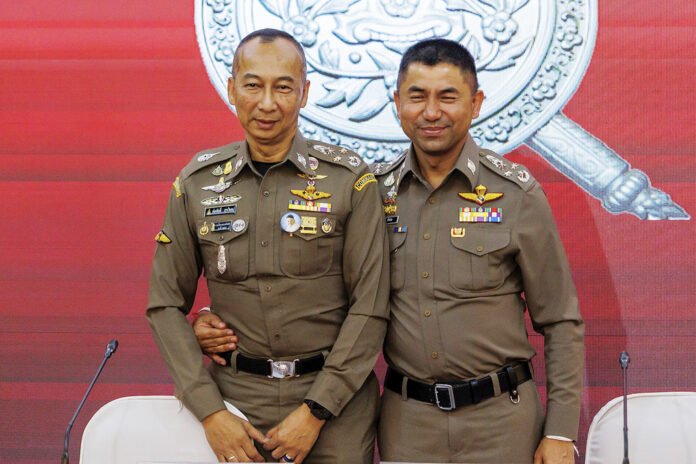- Popular Post
-
Posts
3826 -
Joined
-
Last visited
Content Type
Profiles
Forums
Downloads
Posts posted by nobodysfriend
-
-
- Popular Post
- Popular Post
14 hours ago, snoop1130 said:“This completely dares the power of Patong police officers. Foreigners are not afraid of Thai laws. They even dared to spray messages on the footpath. Police, look at this. Do not arrest only Thais. This will ruin the image of tourism in the province.”
Sick and tired of all this xenophobic BS .
-
 3
3
-
19 hours ago, georgegeorgia said:
I was quite fascinated or there could be another word ....please use it
But again ....they said it !
A Pattaya YouTuber this time describing how newbies come out to Thailand a few times meet a lady or guy ,person ( gender neutral please ) and BUY a bar !
Pattaya YouTuber gives a example 55yo divorced Kevin leaves the UK and has been to pattaya a few times ,decides to quit his job ,use half the divorce to buy a business ,it all goes "belly up " ( the YouTubers words ) and Kevin goes home "with the tail between his legs "
I immediately emailed the YouTuber asking for evidence!!!!
Then the umpteen YouTuber says
"They went back ( to their home country) with their tail between their legs " !!!
Now researching this many meanings , and please only academics please correct me .
Let me put my spectacles on and read the meaning " they got scared ,or ashamed and left !
So ok .......in reality I thought about this and despite this being said millions of times on YouTube and forums I have NEVER known anyone who went back as meaning the tail between their legs ashamed "scared "
Now where is the evidence that anyone actually failed at bar business and yes we are talking Thailand on this one , not for the millions of Phillipines and Cambodian expats on here , although ok we can include Cambodia!
But the question is ......have you personally known not heard any farang who came to Thailand bought a bar and ...."went back with the tail between his legs"!
It's a myth is it not ?
Is that you , Gammaglobulin ...?
-
5 hours ago, webfact said:
MOST PEOPLE WOULD STILL prefer former Move Forward leader Pita Limjaroenrat as the most popular politician for prime minister,
Not good for him .
Move foreward party will be disbanded , and Pita himself will be banned from politics for lifetime .
" Forty-four MPs of the Move Forward Party (MFP), including its chief adviser Pita Limjaroenrat, could face a political ban for life as they are now the subject of a probe into whether they adhered to the code of ethics over their stance on the lese-majeste law. "
You don't believe it ?
Wait and see ...
TIT
-
 1
1
-
 1
1
-
-
On 3/23/2024 at 2:34 PM, GammaGlobulin said:
Or, THIS TIME, will Xi kill China, finally?
Read about Xi's background ...
https://www.britannica.com/biography/Xi-Jinping
Early life
Xi Jinping was the son of Xi Zhongxun, who once served as deputy prime minister of China and was an early comrade-in-arms of Mao Zedong. The elder Xi was often out of favor with his party and government, however, especially before and during the Cultural Revolution (1966–76) and after he openly criticized the government’s actions during the 1989 Tiananmen Square incident. The younger Xi’s early childhood was largely spent in the relative luxury of the residential compound of China’s ruling elite in Beijing. During the Cultural Revolution, however, with his father purged and out of favor, Xi Jinping was sent to the countryside in 1969 (he went to largely rural Shaanxi province), where he worked for six years as a manual laborer on an agricultural commune. During that period he developed an especially good relationship with the local peasantry, which would aid the wellborn Xi’s credibility in his eventual rise through the ranks of the CCP.
Entry into the CCP, education, and marriage
In 1974 Xi became an official party member, serving as a branch secretary, and the following year he began attending Beijing’s Tsinghua University, where he studied chemical engineering. After graduating in 1979, he worked for three years as secretary to Geng Biao, who was then the vice premier and minister of national defense in the central Chinese government.
In 1982 Xi gave up that post, choosing instead to leave Beijing and work as a deputy secretary for the CCP in Hebei province. He was based there until 1985, when he was appointed a party committee member and a vice mayor of Xiamen (Amoy) in Fujian province. While living in Fujian, Xi married the well-known folk singer Peng Liyuan in 1987. He continued to work his way upward, and by 1995 he had ascended to the post of deputy provincial party secretary.
Ascent in the CCP
In 1999 Xi became acting governor of Fujian, and he became governor the following year. Among his concerns as Fujian’s head were environmental conservation and cooperation with nearby Taiwan. He held both the deputy secretarial and governing posts until 2002, when he was elevated yet again: that year marked his move to Zhejiang province, where he served as acting governor and, from 2003, party secretary. While there he focused on restructuring the province’s industrial infrastructure in order to promote sustainable development.
Xi’s fortunes got another boost in early 2007 when a scandal surrounding the upper leadership of Shanghai led to his taking over as the city’s party secretary. His predecessor in the position was among those who had been tainted by a wide-ranging pension fund scheme. In contrast to his reformist father, Xi had a reputation for prudence and for following the party line, and as Shanghai’s secretary his focus was squarely on promoting stability and rehabilitation of the city’s financial image. He held the position for only a brief period, however, as he was selected in October 2007 as one of the nine members of the standing committee of the CCP’s Political Bureau (Politburo), the highest ruling body in the party.
With that promotion, Xi was put on a short list of likely successors to Hu Jintao, general secretary of the CCP since 2002 and president of the People’s Republic since 2003. Xi’s status became more assured when in March 2008 he was elected vice president of China. In that role he focused on conservation efforts and on improving international relations. In October 2010 Xi was named vice chairman of the powerful Central Military Commission (CMC), a post once held by Hu (who since 2004 had been chair of the commission) and generally considered a major stepping-stone to the presidency. In November 2012, during the CCP’s 18th party congress, Xi was again elected to the standing committee of the Politburo (reduced to seven members), and he succeeded Hu as general secretary of the party. At that time Hu also relinquished the chair of the CMC to Xi. On March 14, 2013, he was elected president of China by the National People’s Congress.
Consolidation of power
Among Xi’s first initiatives was a nationwide anti-corruption campaign that soon saw the removal of thousands of high and low officials (both “tigers” and “flies”). Xi also emphasized the importance of the “rule of law,” calling for adherence to the Chinese constitution and greater professionalization of the judiciary as a means of developing “socialism with Chinese characteristics.” Under Xi’s leadership China was increasingly assertive in international affairs, insisting upon its claim of territorial sovereignty over nearly all of the South China Sea despite an adverse ruling by the Permanent Court of Arbitration in The Hague and promoting its “One Belt, One Road” initiative for joint trade, infrastructure, and development projects with East Asian, Central Asian, and European countries.
Xi managed to consolidate power at a rapid pace during his first term as China’s president. The success of his anti-corruption campaign continued, with more than one million corrupt officials being punished by late 2017; the campaign also served to remove many of Xi’s political rivals, further bolstering his efforts to eliminate dissent and strengthen his grip on power. In October 2016 the CCP bestowed upon him the title of “core leader,” which previously had been given only to influential party figures Mao Zedong, Deng Xiaoping, and Jiang Zemin; the title immediately raised his stature. A year later the CCP voted to enshrine Xi’s name and ideology, described as “thought” (“Xi Jinping Thought on Socialism with Chinese Characteristics in a New Era”), in the party’s constitution, an honor previously awarded only to Mao. Xi’s ideology was later enshrined in the country’s constitution by an amendment passed by the National People’s Congress (NPC) in March 2018. During the same legislative session, the NPC also passed other amendments to the constitution, including one that abolished term limits for the country’s president and vice president; this change would allow Xi to remain in office beyond 2023, when he would have been due to step down. The NPC also unanimously elected Xi to a second term as president of the country in March.
Xi’s power and influence were bolstered in 2021 when the CCP passed a historical resolution in November that reviewed the party’s “major achievements and historical experience” of the past 100 years and looked to future plans as well. It featured praise for Xi’s leadership; more than half of the document was devoted to the accomplishments under Xi in the nine years he had led the party, such as reducing poverty and curbing corruption. It was only the third such resolution in the party’s history—the previous two were passed under Mao and Deng—and it elevated Xi’s status, ensuring that he would be seen as a significant figure in the party’s history.
In October 2022 Xi was unanimously elected to a historic third term as general secretary of the CCP, further consolidating his power. On the same day, the party unveiled the 20th Politburo Standing Committee, which, in addition to Xi, consisted of six Xi loyalists. On March 10, 2023, Xi also secured an unprecedented third five-year term as president of China, a development that was widely expected after the Chinese constitution was amended in March 2018 to remove the two-term limit on the presidency. As the only candidate, Xi garnered the votes of all 2,952 delegates to the Congress to remain the head of state.
-
16 hours ago, brianthainess said:
Could open a Psycho bar but you'd be the only customer.
Don't be sure ... lots of psychos around ...
-
 2
2
-
-
16 hours ago, georgegeorgia said:
I love a German sausage every now and again , what kind of sausage do you like ?
Is it painful ...?
-
- Popular Post
- Popular Post
4 hours ago, webfact said:horrific motorcycle accident in Rawai Phuket early on Sunday morning.
4 hours ago, webfact said:It appears that one motorbike collided with the other as they raced along the road.
Big bikes , hot temperatures , thai ladies , drinks , late night , drivers inexperienced ... what could go wrong ?
There should be no more big bikes available for rent to anyone .
-
 3
3
-
 1
1
-
 1
1
-
 9
9
-
- Popular Post
- Popular Post
3 hours ago, webfact said:It came following shocking revelations of industrial-level corruption within the Royal Thai Police revealed by General Surachate’s lawyers on Tuesday...
...that explains a lot .
Mafia like , money laundering structures exposed within the RTP ... Thailand risks to lose it's beloved " face " over this ... and many high-ranking officers fear that their " unusual wealth " may be discovered ...?
-
 4
4
-
 2
2
-
 1
1
-
 1
1
-
 5
5
-
10 hours ago, Social Media said:
At least 40 people have lost their lives, and over 100 others have been injured in what appears to be a meticulously planned and executed attack.
3 hours ago, bamnutsak said:I'm kind of surprised he didn't get 108% of the vote in the recent election.
He learned the lesson from Lukashenko .
-
You should go and look up all the other famous individuals who are considered ‘geniuses’ by the rest of the world.
You will eventually realize that ‘genius’ is simply a label. It can be applied to many different types of people for many different reasons.
But through it all, all ‘geniuses’ seem to have one thing in common:
They are known for what they DID. Not simply for what they can do, or what they think they can do.
So really, what should you do?
You should go on out and focus on doing.
If you are truly a genius in some respect or another, you should definitely do something with those traits that make you so remarkable.
Leave your mark on the rest of the world.
-
3 minutes ago, GammaGlobulin said:
But, maybe the only reason I believe this is that I am a....
GENIUS?
https://www.quora.com/What-do-I-do-if-I-truly-believe-I-am-a-genius
..."
It's great to have confidence in yourself and your abilities, but it's important to also be humble and realistic. Here are some things you can do if you believe you are a genius:
- Seek validation from others: If you truly believe you are a genius, seek validation from people who are knowledgeable and experienced in your field. This will help you get a better understanding of your abilities and where you stand in comparison to others.
- Keep learning: No matter how smart you are, there is always more to learn. Keep pushing yourself to learn more and improve your skills. This will help you stay on top of your game and continue to grow as a person.
- Avoid arrogance: It's important to avoid becoming arrogant or condescending towards others. Remember that everyone has their own strengths and weaknesses, and that you can learn something from everyone you meet.
- Use your talents to help others: If you truly are a genius, use your talents to help others. Whether it's volunteering your time, teaching others, or working on projects that benefit society, use your abilities to make a positive impact on the world.
- Keep an open mind: It's important to keep an open mind and be willing to consider different perspectives and ideas. This will help you continue to learn and grow, and will also help you avoid becoming stagnant or complacent in your thinking. ..."
-
Thai rak thai ...
-
A desperate search for enlargement techniques ...
Let the woman watch , may be it makes her horny , too ...?
-
-
- Popular Post
4 hours ago, webfact said:set to span 10 days, is projected to pull in millions of tourists, raking in an estimated 20 billion baht in revenue.
They always dream of millions that spend billions ... they count the money before they have it ... greedy bunch of dreamers ...
-
 4
4
-
38 minutes ago, Thingamabob said:
He says he will return to Thailand on 1 April after just 5 days in the UK. Not much of a vacation.
He said april 1st , but he did not say what year .
-
28 minutes ago, hotchilli said:
In the photo OP it's hard to tell which female is Ms. B
It is Ms. " Calvin Klein " I presume ...
But she hides very well ...
-
 1
1
-
 1
1
-
-
11 hours ago, snoop1130 said:
the accident happened while they were using a crane to move trees in front of the shopping mall. Unfortunately, the crane’s arm swung into contact with high-voltage power lines, resulting in the devastating electrocution.
Their own fault .
Not careful enough .
They should have seen the power cables .
-
12 hours ago, snoop1130 said:
scrutiny has led to the discovery that many Chinese restaurants were operating without the necessary permits.
Scrutiny initiated by concurrent restaurant owners ?
-
12 hours ago, snoop1130 said:
two cutting-edge waste-to-energy plants to revolutionise waste management ...
Waste to energy is a good concept .
The waste will probably be burned ... but will the emissions be filtered to assure that there will not be a any toxic pollutants ?
If not , the old landfill method is even better ...
-
 1
1
-
 1
1
-
-
12 hours ago, snoop1130 said:
being shot at the back of his head
12 hours ago, snoop1130 said:who was also shot at the back of his head
12 hours ago, snoop1130 said:deceased at a local hospital after being shot at the head and in his chest twice.
Looks like a mafia style execution .
Must have been farangs , thais would not do that . And there is no mafia in Thailand , either .
-
 1
1
-
-
4 hours ago, webfact said:
entered the house to find many foreigners who were playing poker.
Should have been playing Russian Roulette instead ...
-
 1
1
-
-
- Popular Post
35 minutes ago, Srikcir said:I was concerned about the timing of this picture as no credit given to photographer. But found same picture uncropped with credit to photographer Pirun Nanta. https://mail.google.com/mail/u/0/?hl=en#inbox/FMfcgzGxSRFVkKmdwfjpmkppMQgdQHQf
Brothers in Arms .
-
 3
3
-
Tried to find a thai who takes care of the garden ... = impossible .
One worked some days , but left directly after I asked him if he has eyes ( Mai mee taa , mai ? ) .
The plant he was watering died already of thirst ...
-
 1
1
-





Giant Italian-Thai behemoth fights for survival and to pay wages
in Thailand News
Posted
The revenge of the black panther ...